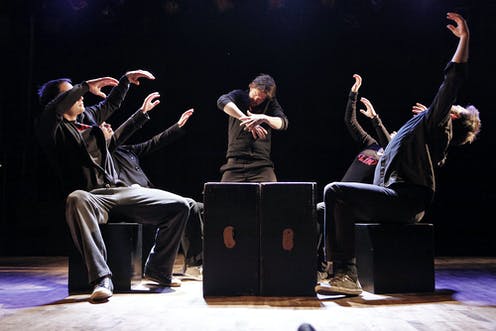I think life should be more like improv and improv should resemble life.
On a whim, I went to hideout theatre in Austin, TX for a improv beginner class back in 2016 but I have only been consistently doing improv for the past year. In the process, I have tried short and long form improv, and dabbled in musical/rap improv. Having zero theatre/stage background, it has been amazing to me how the lessons learnt from improv apply to life broadly.

Yes, and..: A 101 on improv would begin with the encouragement to accept whatever the other person is bringing to the scene. We may have a great idea in mind, but the scene is ruined if we do not accept the other person’s ideas and bind the scene in a cohesive way. Taking this attitude to life can frame anything in life as a gift. This in turns lends us to be less critical and cynical about our day to day interactions.
Go with the first thing that comes to mind: Perfect is often the enemy of the good. Overthinking can stand in the way of action when spontaneity may have been the right choice. In improv, trying to think of a funny punchline can ruin an act, taking away from it the natural flow of the scene. On the other hand, going with the first thing that comes to mind often leads a scene to wonderful surprises. Real life decisions do involve more thought, but the training against overthinking still holds and can help us live a more spontaneous life and overcome the fear of taking action.
Embracing failure: Making a fool of yourself is encouraged and celebrated in improv. The very act of complete unpreparedness on stage, taking the audience’s suggestion to theme a scene and strangers as partners means that you don’t have any semblance of control. There is no guarantee that an improv scene will be funny to the audience or reach a satisfying closure. But everyone in improv understands this, and supports your choices on stage regardless. This empowers improvisers to be authentic on stage. It also makes us realize that the consequences of failure may be less than we realize. This training is so important in life where fear of failure can hold us back.
Make others look good: In improv, we succeed when we have made the others on stage successful. Supporting their ideas, pointing out the authenticity of their actions and emotions goes a long way into making a scene feel natural and relatable to the audience. When working with improvisers who are gifted in building out storylines, a great way to complement their work is to add other dimensions to the scene such as a location, timeline or other context to create a richer, vivid scene. This prioritizing of win-win mentality is a great habit for teams, since an effective team should be greater than the sum of its individuals.
Make statements, don’t ask questions: Making statements adds material to a scene, whereas a question puts the burden on the other to come up with the material. This is why it is encouraged in improv to limit questions and respond with statements. This is great for your communication skills, making conversations feel less like interrogations. People feel more at ease in a conversation when they feel they don’t have to do all the work. A related advice is to try and use every sentence in improv as if it would be a closing sentence, since a scene could end at any moment.
Leading with emotions: An audience is watching an improv scene has a fuller experience when they not only hear the words but see the emotions of the performers. Life is certainly more complicated. If you are investing in the stock market or playing poker, it is best to distrust or hide your emotions. On the other hand, lot of us lack the ability to emote even when situations demand it, because our upbringing has taught us to treat display of emotions as weakness. Improv can help unlearn and be more expressive in situations when we should lead with our emotions.
Take the scene somewhere: In an improv scene, you and your partner create a character and a world which has the shelf life of the scene. The scene can be as short as a minute and half. It is great for the audience when the scene builds up to something, has a beginning, middle and end. In the movie of our lives, we are the protagonists living our story. The practice of improv helps us build a viewpoint of our lives from a third party perspective, and can make us wonder how we want the protagonist to act. To use a computing analogy, it would be similar to seeing life from a debug mode.
Listen: There simply cannot be a good scene where you ignore the words, behavior and actions of your partner. Improv helps emphasize the importance of listening, the power of which is well understood.
Have fun: The audience knows when the performers are enjoying themselves, and can feel they are part of it too.
Commit to a scene: A more experienced improviser advised me to commit with your voice, face and your body. The practice of complete immersion in a scene can help us be more present when we show up in life.
The beauty of improv is that you don’t have to become a great improviser to see the positive effects it can have on your life. Those of us who believe in constant improvement and are interested in living a more examined life and will find improv valuable.
